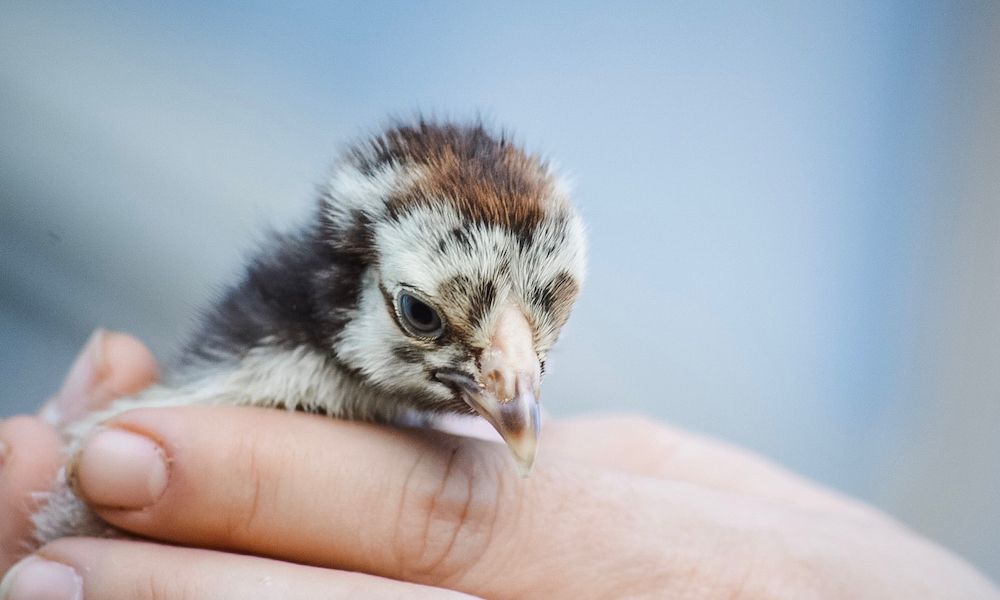Is It Illegal to Rescue a Baby Bunny in Pa

Baby Wildlife & Summer
Baby Wildlife & Summer
At Humane Animal Rescue's Wildlife Rehabilitation Center, summertime is known as "baby season". It's exactly what it sounds like! During the warm months, wildlife have their babies! Food is abundant, the weather is nice (at least, typically!), and the trees and plants offer plenty of safe cover for growing babies. In 2019, our Wildlife Rehabilitation Center took in over 4,000 wild animals, with most intakes being injured or orphaned babies that needed to be raised by our licensed staff before they could be safely released back to their natural habitat.
While good Samaritans are trying to save these orphaned baby animals, some of the young animals that are brought to us have actually been "baby-napped"! We define "baby-napped" animals as animals that are healthy and could have been left in the wild for their parent to care for them. The parents of baby-napped critters are often close by, even if they can't be seen at first glance. Just because a baby is alone doesn't mean it has been abandoned!
Please Note: If any animal has been in a dog or cat's mouth, even if there are no visible wounds, it should be brought to the Wildlife Rehabilitation Center for treatment. Bacteria in a pet's mouth can be deadly to wildlife. If you aren't sure if a wild animal should be taken to a rehabber, give our Helpline a call!
Read below for some tips to avoid being a "baby-napper"…
Eastern Cottontail Rabbits
To put it mildly, wild rabbit moms are not great moms – at least, not to human standards. They feed their babies at dawn and dusk to avoid attracting predators, but stay away during the day for the safety of their young as they are easily spotted by predators.
Rabbit nests aren't obvious until stumbled upon. They are typically shallow holes in the ground, covered back over with grass. People often discover nests while mowing their lawns or doing yard work, or our pets or kids will find them while outside playing on a spring or summer day. While these nest locations don't seem great to us, rabbit moms think they're perfect. If you do find a nest, don't automatically assume that the babies have been abandoned. Sprinkle flour in a circle around the next in the afternoon and check back the next to see if the flour ring has been disturbed by mom!
If you find a baby rabbit outside of a nest, you can gently place it back into the nest. Don't worry, it's a myth that the mom will reject the baby if you touch it! It's not uncommon to find baby rabbits outside their nests – once their eyes open, they become curious and start exploring. At only three weeks old (about the size of your fist), rabbits are ready to be independent!
Squirrels
Did you know that we actually see four different species of squirrels at our Wildlife Rehabilitation Center? While all four species are slightly different, they all make pretty great moms!
Squirrels make their nests in tree cavities or in the branches out of sticks and leaves (called a drey). This makes spotting a nest difficult to the human eye. If you find a baby squirrel that has fallen from its nests, their parents might still be close by, but it may take mom some time before she hears the baby's cries.
The best way to reunite a baby squirrel with mom is to place it in a box at the base of the tree it fell from, or as close as you can get. Then, go back into your house and wait. Squirrels will not risk getting their baby with a human around, and it can even take up to 4-5 hours until the baby is back in the nest.
If the baby is still in the box after you've waited at least 5 hours, bring the box inside to keep it safe and warm. Then, call our Wildlife Rehabilitation Center for further advice at 412-345-7300 ext. 500.
Birds
Our Wildlife Rehabilitation Center doesn't just take in mammals, we also care for injured and orphaned birds as well! Like rabbits, most birds develop quickly and will leave the nest within a matter of weeks. Depending on the specific species, one or both parents will care for their young for a short time after they leave the nest. While fledglings, birds during the "teenage" stage of development, are no longer in the nest, they are still cared for by parents as they learn to be independent and grow out their feathers.
We often receive bird patients when a good Samaritan finds a bird that cannot fly, but a lot of the birds turn out to be fledglings – so, it is normal that they cannot fly yet! Fledglings are often found in yards or in bushes, hiding from predators. If you find a fledgling somewhere unsafe, you can move it to cover that is very close by, but it cannot be moved too far away as the parents may not not be able to find it!
Sometimes, young birds that are still meant to be in the nest will fall out. If the baby bird is not injured, we always recommend trying to put the baby back into its nest. Birds have a poor sense of smell, so they will not reject a baby just because it has been handled. If the nest is easily accessible, the baby can be placed directly into the nest. If the nest is too high, the baby bird can be placed into a basket or bowl with dried substrate or materials, then placed as close to the nest site as possible (it must be the same tree). Then, head back into your house and wait. It's important to watch the basket to see if the parents are coming to feed the now separated baby. If they are not, please call the Wildlife Rehabilitation Center at 412-345-7300 ext. 500 for further advice.
Please Note: Birds don't always build their nests in the most ideal places. The Migratory Bird Treaty Act makes it illegal to disturb an active nest of any native bird without a permit (with a few exceptions). This includes nests that are in an inconvenient location or nests that are unsightly.
Fawns
Our Wildlife Rehabilitation Center cannot care for deer as we not have the necessary permits required. Although we are not able to rehabilitate deer, here are some resources if you find a fawn or injured deer.
Like rabbits, deer often don't leave their babies, or fawns, in what we would consider a safe place. Moms will leave their fawns bedded down, often in a yard or on the side of the road, for hours at a time she looks for food. Fawns will lay down the entire time their mom is gone and will not even get up if approached. This doesn't mean that they are injured, it is just their natural instinct!
As long as they are not in a truly dangerous place, they can be left alone until mom comes back to get them. If a fawn has flies on it's hind, or if it is wandering around and vocalizing (crying), then it is possible that it needs help! It is normal for a fawn's ears to be curled at the ends, this does not mean that it is dehydrated or abandoned.
For help with fawns, please call the PA Game Commission at 724-238-9523.
Please Note: While our Wildlife Rehabilitation Center is a great resource for wildlife, it is always in the animal's best interest to stay with its parents, when possible. Young animals have their best chances at success while being cared for by their parents.
If you do find a truly abandoned or injured wildlife animal, please call our Wildlife Rehabilitation Center's Helpline at 412-345-7300 x500. The Center's hours are 8:00am – 4:00pm daily. Please refrain from feeding them until they arrive as young animals have very sensitive digestive systems with specific dietary needs. Feeding them incorrect diets or milk can be harmful to their health.
For more information and resources, please visit our Wildlife Resource Page or contact the Wildlife Rehabilitation Center Helpline at 412-345-7300 ext. 500.
DONATE
Make a Difference!
Your gift today will help save an animal's life. We rely on donations from friends like you to rescue, shelter, and find homes for pets. Please be as generous as you can to help us give them the care they need and the love they deserve.
ADOPT
Care They Need.
Love They Deserve.
NEWSLETTER SIGN UP
Interested in more content like this? Subscribe & follow us to stay up-to-date.
Share this with a friend...
Related Posts
EXPLORE
OUR LOCATIONS
East Side
6926 Hamilton Avenue
Pittsburgh, PA 15208
412-345-7300
Directions HERE.
North Side
1101 Western Avenue
Pittsburgh, PA 15233
412-345-7300
Directions HERE.
Wild Side
6000 Verona Road
Verona, PA 15147
412-345-7300
Directions HERE.
© Copyright 2021 Humane Animal Rescue – Site by Blink

© Copyright 2021 Humane Animal Rescue – Site by Blink
Is It Illegal to Rescue a Baby Bunny in Pa
Source: https://humaneanimalrescue.org/baby-wildlife-summer/

0 Response to "Is It Illegal to Rescue a Baby Bunny in Pa"
Post a Comment